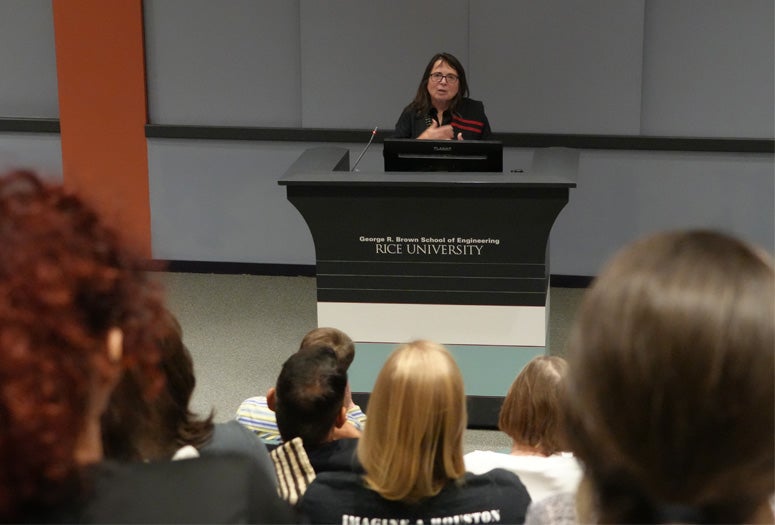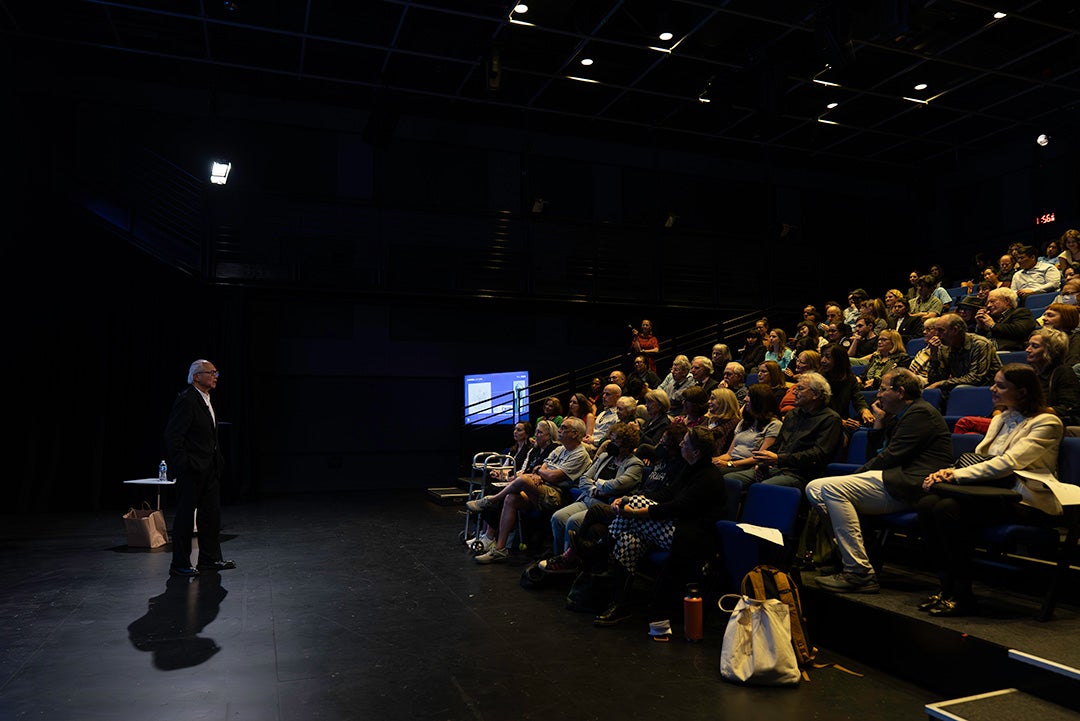
Rice University’s School of Humanities and Arts has long extended its intellectual footprint beyond the hedges, bringing leading scholars, writers and artists to Houston through a wide array of named lectures. These series, which are supported by donors and departments across the school, offer the Rice and Houston communities a chance to engage with scholarship that resonates far outside the classroom.
At the schoolwide level, two major series reflect this commitment to scholarship with global reach: the Campbell Lecture Series and the Kazimi Lecture in Shi’i Studies.
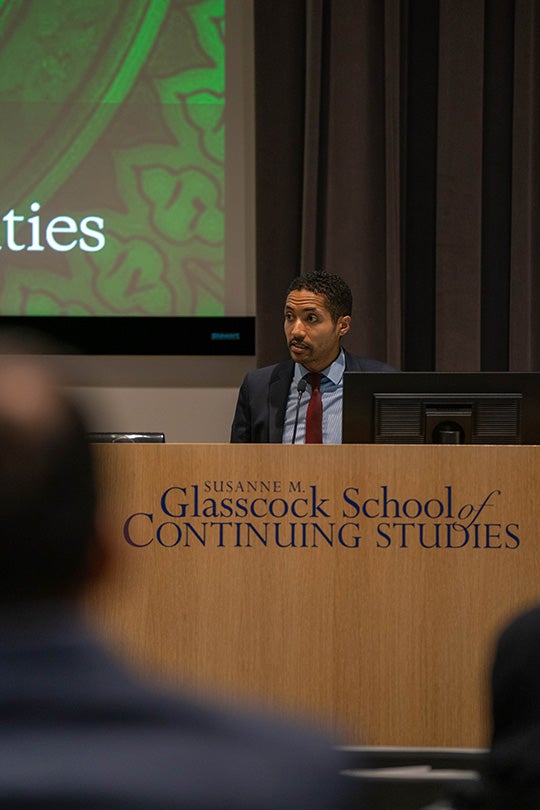
“The Campbell and Kazimi lectures bring to Houston distinguished thinkers whose work speaks across disciplines and communities,” said Kathleen Canning, dean of the School of Humanities and Arts. “From journalists and historians to scholars of religion and culture, these programs expand Rice’s role as a place where the most pressing issues of our time are explored in dialogue with our city and the wider world.”
The Campbell Lecture Series, supported by the Campbell Foundation, brings distinguished figures in the arts, literature and humanities to Rice each year. This fall, the series welcomes Jelani Cobb, a Peabody Award-winning journalist and staff writer at The New Yorker, who will explore the role of demography in shaping the crisis of American democracy. His two-night program scheduled for Nov. 19 and 20 will examine how race and immigration intersect with history to shape contemporary political conflicts.
Through a gift from the Kazimi family, the Kazimi Lecture in Shi’i Studies highlights the diversity of Islamic thought and culture. Each year, scholars or artists are invited to present work that advances understanding of Shi’i Islam in its many dimensions. The upcoming installment is planned for spring.
The Chao Center for Asian Studies organizes several lecture series, including the Frank and Cindy Liu Distinguished Visitor Series and the Transnational Asia Speaker Series. The latter continues this fall with programs by Andrew Schonebaum of the University of Maryland Oct. 16 and Eric Schluessel of George Washington University Oct. 24.
“For the Transnational Asia Speaker Series, faculty invite speakers from across the country to speak on a variety of themes in a range of disciplines, all related to the transnational quality of their research,” said Lisa Balabanlilar, the Joseph and Joanna Nazro Mullen Professor in the Humanities, chair of the Department of Transnational Asian Studies and director of the Chao Center. “The Frank and Cindy Liu Distinguished Visitor series is, I think, quite unusual in that it is not directed to an entirely academic audience. Frank Liu, a Rice alumnus (Lovett College) encouraged us to bring artists, business people, musicians and performers. Last year was exceptional in that the Liu series sponsored the visit to campus of Dr. Shashi Tharoor, an author and minister of Parliament in India and followed that with a series of three talks reflecting on the legacy of American involvement in the war in Vietnam.”
The Department of Art History honors the legacy of a Rice pioneer through the Katherine Tsanoff Brown Lecture Series. Named for a founding member of the department and a former dean of undergraduate affairs, the series has brought scholars of art and visual culture to campus since 2017.
“The Katherine Tsanoff Brown Lecture Series is at the very heart of the intellectual life of the art history department,” said Leo Costello, associate professor of art history and chair of the department. “It is the only series on campus dedicated to bringing scholars of art and visual culture to campus, and because it’s not restricted to period or geographical limits, we’re able to curate an incredible range of speakers and topics from year to year.”
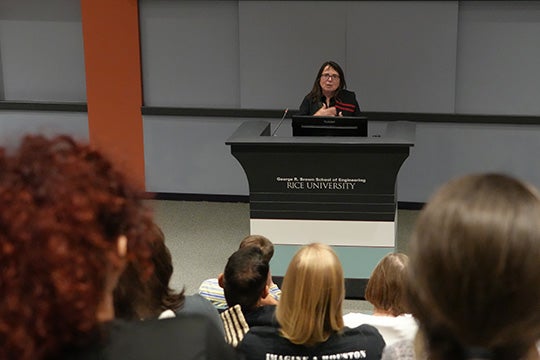
The next Brown Lecture scheduled for Jan. 27 will feature Alicia Caticha, an art historian specializing in 18th- and 19th-century European sculpture and decorative arts. Her current book project “Sculpting Whiteness: Marble, Porcelain and Sugar in 18th-Century Paris” examines how the replication of whiteness in these materials shaped both aesthetic ideals and racial hierarchies, placing them in dialogue with France’s history of colonialism and the Atlantic slave trade.
The Center for the Study of Women, Gender and Sexuality (CSWGS) hosts two lecture series that connect academic scholarship with pressing public issues. The Gray/Wawro Lectures in Gender, Health and Well-being highlight gender as a key factor in determining health and quality of life. This October, the series will feature Katherine McKittrick, Canada research chair in Black studies at Queen’s University, who will speak on black geographies, anticolonial studies and critical-creative methodologies.
“No other series at Rice centers gender in relation to health and well-being,” said Lora Wildenthal, the John Antony Weir Professor of History and director of CSWGS. “The decision back in 2010 by center leadership Melanie Gray and Mark Wawro for ‘health and well-being’ has proven to be inspired. Gender and health remain an area of burgeoning research and intense politicization. ‘Well-being’ has allowed us to extend ‘health’ in surprising and innovative ways. Together, these themes help us to think unconventionally about what people need to hear about why and how gender matters in our lives.”
The Marian Fox Martel Distinguished Lectures in Gender and Science bring senior scholars to campus to discuss the intersections of gender and scientific research. April 13, the series will host Robin Wall Kimmerer, State University of New York Distinguished Teaching Professor of Environmental Biology and author of “Braiding Sweetgrass.” Kimmerer, a MacArthur Fellow, has been widely recognized for her work blending Indigenous wisdom and scientific knowledge to illuminate sustainable practices.
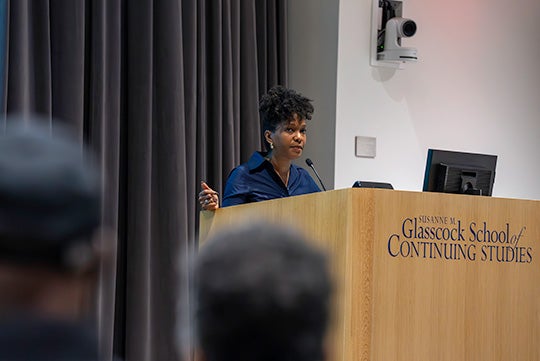
and Harvard University professor Imani Perry led two consecutive nights of engaging and wide-ranging discussions for the fall 2023 Campbell Lecture Series. (Photo by Gustavo Raskosky)
“The Martel Distinguished Lectures in Gender and Science feature the enduring relevance of that conversation,” Wildenthal said, emphasizing how feminist studies have transformed the study of science. “Individual lectures also help to connect different networks across our campus — like Scientia events but with a continuous focus on gender.”
The Department of History sponsors the Ervin Frederick Kalb Lecture in History, endowed in memory of a Rice alumnus from the Class of 1916. The Kalb Lecture brings leading historians to campus each year with the next installment featuring Nancy Tomes of Stony Brook University Feb. 23.
“It’s the history department’s marquee annual event held early in spring semester,” said Nathan Citino, the Barbara Kirkland Chiles Professor of History and department chair. “We invite top historians who have made major contributions to their field or even helped to create new fields of historical scholarship. It’s an opportunity for our faculty, graduate and undergraduate history students as well as members of the Rice and Houston communities to interact with some of the most prominent historians in the world.”
The Department of English and Creative Writing continues to host the Camden Lecture Series, which invites specialists in pre-1800 studies. Meanwhile, the Department of Religion stewards the Rockwell Lecture Series, founded in 1938, which has evolved into an annual international conference and remains one of the oldest traditions of public scholarship at Rice.
Whether it’s a journalist unpacking democracy, a historian reframing medicine or an artist probing the legacies of empire, these lectures invite the community to listen, learn and question. All are open to the public — an open door for Houstonians to step inside Rice and take part in conversations that matter.

